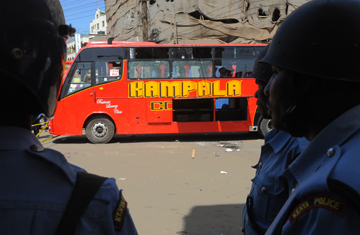
Kenya policemen stand at the scene on December 21, 2010 where three people were killed and 23 wounded in a bomb attack on a Kampala bound bus in central Nairobi.
A grenade explosion at a bus depot in downtown Nairobi that killed three people is the work of Somali militants making good on their threat to ruin Christmas for countries backing the Transitional Federal Government in Mogadishu — at least, that's the assessment of Kenyan and Ugandan security officials, who are bracing for further attacks.
The Monday night blast came just hours after officials in neighboring Uganda had warned that Somalia's al-Shabab might be planning attacks as part of their campaign against countries such as Uganda that have supplied troops to an African Union force protecting Somalia's embattled government. The Ugandan capital, Kampala, was the target of twin suicide bombings that killed 76 people during the soccer World Cup final in July.
The bus attacked in Kenya had been on its way to Kampala, and Kale Kayihura, Uganda's inspector general of police, told reporters Tuesday that al-Shabab may have been responsible. On Tuesday, Kenyan Police Chief Mathew Iteere identified the man responsible as a Tanzanian who was bringing the grenade to Uganda and was killed in the blast. He said the man panicked after seeing that security teams were checking passengers boarding the bus, and dropped a bag carrying the grenade, triggering the explosion.
"It is only that the man became nervous and dropped it and it exploded. He died," Iteere said.
Two weeks earlier, a policeman was killed in a Somali neighborhood of Nairobi when someone threw a grenade into his vehicle. Following that attack, Kenyan police asked the U.S. FBI for help, and later arrested almost 300 Somali immigrants suspected of being in Kenya illegally.
An al-Shabab spokesman, Sheikh Abdul Aziz Abu Musab, claimed in a phone interview that the bomber was supposed to have taken the grenade to Uganda for an operation there and that the bus was not the target.
"Officially, we cannot say we, al-Shabab, are responsible for this," Musab told TIME, but added: "It is that he failed to hit the right target."
Another al-Shabab official in Somalia's Gedow Region, Sheikh Bishar Adam Hassan, warned that al-Shabab would attack Kenya and Uganda whenever it got the chance, not necessarily by only deploying Somali nationals. "Both the Kenyans and Ugandans interrupt the business of Somalis living in their countries, and their eyes are only watching the Somalis living there," Hassan told TIME. "They do not realize that many among them can cooperate with us, and we won't stop unless they stop harming Somalis."
Kenyan government officials said the blast was meant to spread fear with the Christmas holidays coming up. Kenya is in the middle of a massive migration as people return to their rural homes for the holidays, while thousands of tourists have already begun to fly in for vacations from Europe.
Vice President Kalonzo Musyoka visited some of the 40 people injured in the blast, and President Mwai Kibaki vowed to increase security patrols.
"The security of our people is paramount," Kibaki said in a statement Tuesday. "No efforts will be spared to ensure that security is beefed up."
The grenade killed two bystanders at least three people but was not powerful enough to do much damage to the bus beyond flattening its front left tire and cracking the glass of a few of its windows.
Despite the claims by both al-Shabab and government officials, there was little solid evidence actually pointing to Somalia's militants on Tuesday, and Somali militants have been known to claim credit for all sorts of attacks in the past. Just this week, al-Shabab announced it was joining forces with a rival militant group in Somalia, Hizbul Islam, as part of its bid to oust Somalia's government, which controls only a few acres of land in Mogadishu, and even that with the assistance of African Union troops.
One security expert in Kenya told TIME he is skeptical that al-Shabab was involved because fighters there were probably too distracted by their own problems and the internal shake-up to launch any serious attack.
"They're so busy running around figuring out who's going to take leadership, merging with Hizbul Islam that it's such a mess," the security expert told TIME. "I don't think they have the time or resources to extend anything further out."
The expert cautioned that Uganda and Kenya have both been quick to claim al-Shabab's involvement in attacks before, adding, "Al-Shabab the boogeyman under the bed."
With reporting by Reagan Dawale
